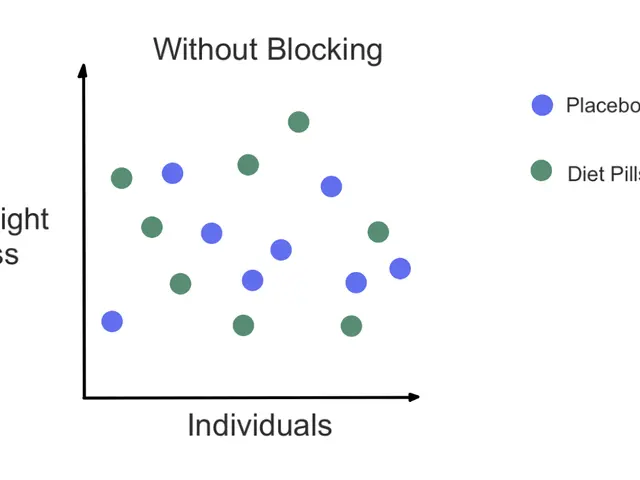Nutritious Meal Schedule for Individuals with Autism
In the pursuit of a healthier lifestyle for children with Autism Spectrum Disorder (ASD), it's crucial to tailor their diet to meet their unique nutritional needs, sensory preferences, and potential gastrointestinal sensitivities. Here, we present a step-by-step guide to creating a balanced and supportive diet for children with ASD:
## Key Nutritional Considerations
1. Address Nutrient Gaps: Many children with ASD have restrictive or selective eating habits, leading to deficiencies in essential nutrients such as calcium, protein, iron, zinc, magnesium, omega-3 fatty acids, B vitamins, and vitamin D. 2. Support Gut Health: There is increasing evidence of a strong gut-brain connection in autism. A healthy gut can improve mood, behaviour, and overall well-being. 3. Minimize Discomfort: Gastrointestinal issues like constipation, bloating, and discomfort are common and should be considered in meal planning.
## Recommended Foods
1. **Protein Sources**: Include poultry, fish, eggs, and lean beef for essential amino acids, iron, zinc, and B vitamins. These nutrients support brain function, mood, and energy levels. 2. **Omega-3 Rich Foods**: Salmon and other small oily fish provide omega-3 fatty acids, which are vital for brain health and reducing inflammation. 3. **Fruits and Vegetables**: Choose fiber-rich and antioxidant-packed options such as blueberries, bananas, avocados, and pears (for children sensitive to salicylates). These support gut health, reduce inflammation, and aid digestion. 4. **Complex Carbohydrates**: Whole grains and starchy vegetables provide steady energy and fiber. 5. **Safe Snacks**: Offer familiar and well-tolerated snacks such as plain crackers, rice cakes, and gluten-free granola bars.
## Foods to Avoid or Limit
1. **Gluten and Dairy**: Many parents report improvements in behaviour and gastrointestinal comfort when these are reduced or eliminated, though individual tolerance varies. 2. **Food Dyes and Additives**: Artificial colors, flavors, and preservatives may contribute to behavioural issues in some children. 3. **Excess Sugars**: Reducing refined sugars can help stabilize mood and energy levels.
## Practical Tips for Meal Planning
1. **Involve a Healthcare Professional**: Work with a registered dietitian to assess your child’s nutritional needs and develop a personalized meal plan. 2. **Introduce New Foods Gradually**: Start with small portions of new foods, presented in a familiar way, to reduce anxiety and resistance. 3. **Respect Sensory Preferences**: Pay attention to texture, temperature, and presentation. Some children prefer plain, predictable foods or specific routines. 4. **Monitor for Gastrointestinal Symptoms**: Adjust the diet as needed if your child experiences discomfort, constipation, or bloating. 5. **Ensure Variety and Balance**: Regularly rotate foods to provide a wide range of nutrients and prevent monotony.
## Sample Meal Plan
| Meal | Example Foods | |-----------|----------------------------------------------------| | Breakfast | Scrambled eggs, whole grain toast, sliced banana | | Snack | Plain rice cake with hummus | | Lunch | Grilled chicken, quinoa, steamed carrots | | Snack | Blueberries or pear slices | | Dinner | Baked salmon, sweet potato, steamed broccoli | | Snack | Gluten-free granola bar |
## Additional Resources
- The Brain Development Diet Plan: Boost Brain in 30-Days is designed to provide kids with vital nutrients that promote the brain's optimal growth and function. - Dairy products should be avoided as they contain Casein, which upon reaction with stomach acid creates exorphins that can cause problems like brain fog, fuzziness, difficulty concentrating, and numbness to pain. - Foods rich in vitamin C include oranges, lemons, papayas, broccoli, and seeds. - Cutting back on sugar and refined carbohydrates while increasing lean protein will enhance judgement and focus while reducing impulsivity. - Examples of foods rich in vitamin B6 include fish, peanuts, soybeans, oats, and bananas.
## Conclusion
A healthy diet plan for children with ASD should be nutrient-rich, balanced, and tailored to individual preferences and tolerances. Prioritize whole foods, address potential nutrient gaps, and minimize foods that may exacerbate behavioural or gastrointestinal symptoms. Collaboration with healthcare professionals is essential to ensure nutritional adequacy and overall well-being.
- The growth and development of children with Autism Spectrum Disorder (ASD) can benefit from a balanced and supportive diet that addresses their unique nutritional needs.
- Nutrient gaps are common in children with ASD due to restrictive or selective eating habits, so it's important to focus on essential nutrients like calcium, protein, iron, zinc, magnesium, omega-3 fatty acids, B vitamins, and vitamin D.
- Supporting gut health is key in improving mood, behavior, and overall well-being for children with ASD as there is a strong gut-brain connection in autism.
- Minimizing discomfort should be considered in meal planning as gastrointestinal issues like constipation, bloating, and discomfort are common for children with ASD.
- Incorporating protein sources such as poultry, fish, eggs, and lean beef in the diet provides essential amino acids, iron, zinc, and B vitamins that support brain function, mood, and energy levels.
- Omega-3 fatty acids, found in salmon and other small oily fish, are vital for brain health and reducing inflammation in children with ASD.
- Fruits and vegetables support gut health, reduce inflammation, and aid digestion in children with ASD.
- Parenting and workplace-wellness should include awareness of medical-conditions, chronic-diseases, cancers, respiratory-conditions, digestive-health, eye-health, hearing, and health-and-wellness, as children with ASD may be affected by these conditions.
- Fitness-and-exercise, skin-care, and therapies-and-treatments are important components of a comprehensive approach to support the overall health of children with ASD.
- Autoimmune-disorders and mental-health are critical areas to focus on when creating a personalized meal plan for children with ASD.
- Skin-conditions can be influenced by nutrition and parenting, so it's important to work with healthcare professionals to address these issues.
- CBD has shown potential benefits in managing symptoms associated with neurological-disorders, although more research is needed.
- Addressing nutrient gaps, supporting gut health, and minimizing foods that may exacerbate behavioral or gastrointestinal symptoms should be the focus when developing a healthy diet plan for children with ASD. Collaboration with healthcare professionals is essential for ensuring nutritional adequacy and overall well-being.





